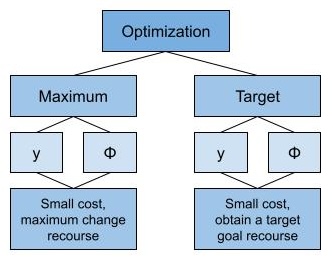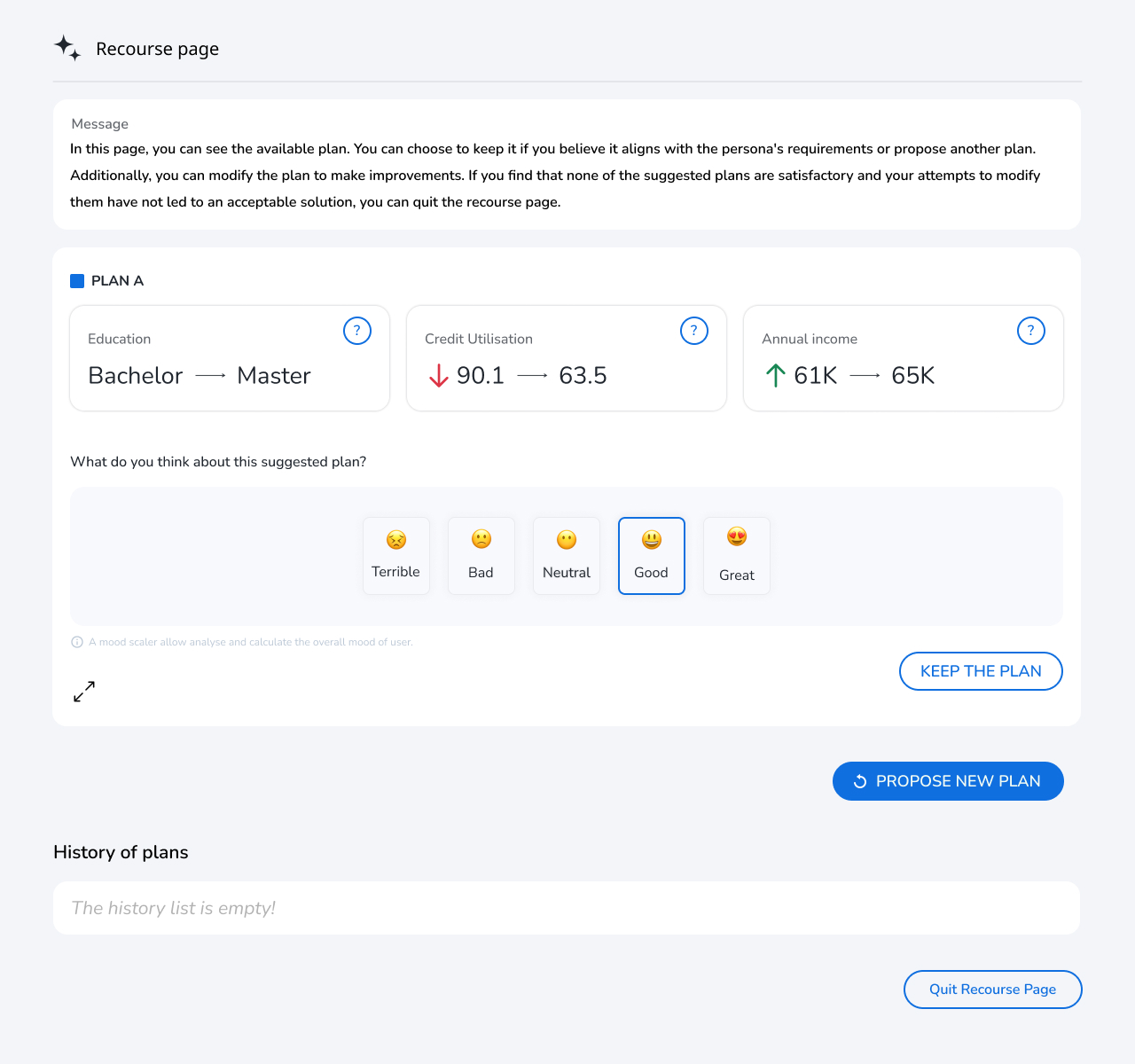Reassessing Evaluation Functions in Algorithmic Recourse: An Empirical Study from a Human-Centered Perspective
2405.14264

0
0
✅
Abstract
In this study, we critically examine the foundational premise of algorithmic recourse - a process of generating counterfactual action plans (i.e., recourses) assisting individuals to reverse adverse decisions made by AI systems. The assumption underlying algorithmic recourse is that individuals accept and act on recourses that minimize the gap between their current and desired states. This assumption, however, remains empirically unverified. To address this issue, we conducted a user study with 362 participants and assessed whether minimizing the distance function, a metric of the gap between the current and desired states, indeed prompts them to accept and act upon suggested recourses. Our findings reveal a nuanced landscape: participants' acceptance of recourses did not correlate with the recourse distance. Moreover, participants' willingness to act upon recourses peaked at the minimal recourse distance but was otherwise constant. These findings cast doubt on the prevailing assumption of algorithmic recourse research and signal the need to rethink the evaluation functions to pave the way for human-centered recourse generation.
Create account to get full access
Overview
- This study critically examines the foundational premise of algorithmic recourse - a process of generating counterfactual action plans to help individuals reverse adverse decisions made by AI systems.
- The key assumption is that individuals will accept and act on recourses that minimize the gap between their current and desired states.
- The researchers conducted a user study to assess whether this assumption holds true.
Plain English Explanation
The paper looks at a process called "algorithmic recourse," where AI systems try to suggest ways for people to change the outcome of a decision made about them. The idea is that these "recourses" will help people get the outcome they want by minimizing the difference between their current situation and their desired situation.
However, the researchers in this study questioned whether this idea really works in practice. They conducted an experiment with over 300 participants to see if people were actually more likely to accept and act on recourses that reduced this "gap" the most.
Their findings revealed a more complex picture. Participants' willingness to accept the recourses did not directly correlate with how much the recourse reduced the gap. And their motivation to actually follow through on the recourses was highest when the gap was smallest, but otherwise remained fairly constant.
These results challenge the common assumption in algorithmic recourse research that people will naturally prefer and act on the recourses that minimize the distance between their current and desired states. It suggests the need to rethink how these recourse generation systems are designed to better align with how people actually think and behave.
Technical Explanation
The researchers conducted a user study with 362 participants to assess the foundational assumption of algorithmic recourse - that individuals will accept and act on recourses that minimize the gap between their current and desired states, as measured by a "recourse distance" metric.
Participants were presented with hypothetical scenarios where an AI system had made an adverse decision about them (e.g. loan denial). They were then shown different recourse options that could potentially reverse the decision, along with the corresponding recourse distance.
The results showed that participants' acceptance of the recourses did not correlate with the recourse distance. Additionally, their willingness to act on the recourses peaked when the distance was minimized, but otherwise remained relatively constant.
These findings contradict the prevailing assumption in algorithmic recourse research and related areas. They suggest the need to rethink the evaluation functions used to design algorithmic recommendations in order to better align with how people actually perceive and respond to recourse options.
Critical Analysis
The paper raises important questions about the underlying assumptions in algorithmic recourse research. While the experiment was well-designed and the findings are compelling, there are a few caveats to consider:
- The study used hypothetical scenarios, so it's unclear how the results would translate to real-world situations where the stakes may be higher for the individuals.
- The recourse options presented to participants were relatively simple and straightforward. More complex or nuanced recourses may elicit different responses.
- The study focused on a single metric of "recourse distance." Other factors like the effort required, social acceptability, or perceived effectiveness of the recourses may also influence individuals' acceptance and willingness to act.
Additionally, the paper does not address potential individual differences in how people evaluate and respond to recourse options. Further research is needed to understand the role of factors like personality, cognitive biases, and cultural background.
Overall, this study highlights the importance of grounding AI systems in a deeper understanding of human decision-making and behavior. The findings challenge the field of algorithmic recourse to move beyond simplistic assumptions and develop more nuanced, human-centered approaches.
Conclusion
This study casts doubt on the prevailing assumption that people will naturally prefer and act on recourse options that minimize the gap between their current and desired states. The researchers found that participants' acceptance and willingness to act on recourses did not always align with the "recourse distance" metric.
These findings signal the need to rethink the evaluation functions used in algorithmic recourse systems to better reflect how people actually perceive and respond to suggested remedies. By adopting a more human-centered approach, the field can develop recourse generation methods that are more likely to empower individuals and lead to positive outcomes.
Ultimately, this research highlights the importance of grounding AI systems in a deeper understanding of human decision-making and behavior. As the use of AI continues to expand, it will be crucial to ensure these systems are designed to support and empower people, rather than making assumptions about their preferences and behaviors.
This summary was produced with help from an AI and may contain inaccuracies - check out the links to read the original source documents!
Related Papers

Relevance-aware Algorithmic Recourse
Dongwhi Kim, Nuno Moniz

0
0
As machine learning continues to gain prominence, transparency and explainability are increasingly critical. Without an understanding of these models, they can replicate and worsen human bias, adversely affecting marginalized communities. Algorithmic recourse emerges as a tool for clarifying decisions made by predictive models, providing actionable insights to alter outcomes. They answer, 'What do I have to change?' to achieve the desired result. Despite their importance, current algorithmic recourse methods treat all domain values equally, which is unrealistic in real-world settings. In this paper, we propose a novel framework, Relevance-Aware Algorithmic Recourse (RAAR), that leverages the concept of relevance in applying algorithmic recourse to regression tasks. We conducted multiple experiments on 15 datasets to outline how relevance influences recourses. Results show that relevance contributes algorithmic recourses comparable to well-known baselines, with greater efficiency and lower relative costs.
5/30/2024

Exploiting Preference Elicitation in Interactive and User-centered Algorithmic Recourse: An Initial Exploration
Seyedehdelaram Esfahani, Giovanni De Toni, Bruno Lepri, Andrea Passerini, Katya Tentori, Massimo Zancanaro

0
0
Algorithmic Recourse aims to provide actionable explanations, or recourse plans, to overturn potentially unfavourable decisions taken by automated machine learning models. In this paper, we propose an interaction paradigm based on a guided interaction pattern aimed at both eliciting the users' preferences and heading them toward effective recourse interventions. In a fictional task of money lending, we compare this approach with an exploratory interaction pattern based on a combination of alternative plans and the possibility of freely changing the configurations by the users themselves. Our results suggest that users may recognize that the guided interaction paradigm improves efficiency. However, they also feel less freedom to experiment with what-if scenarios. Nevertheless, the time spent on the purely exploratory interface tends to be perceived as a lack of efficiency, which reduces attractiveness, perspicuity, and dependability. Conversely, for the guided interface, more time on the interface seems to increase its attractiveness, perspicuity, and dependability while not impacting the perceived efficiency. That might suggest that this type of interfaces should combine these two approaches by trying to support exploratory behavior while gently pushing toward a guided effective solution.
4/9/2024
📈
Explanation Hacking: The perils of algorithmic recourse
Emily Sullivan, Atoosa Kasirzadeh

0
0
We argue that the trend toward providing users with feasible and actionable explanations of AI decisions, known as recourse explanations, comes with ethical downsides. Specifically, we argue that recourse explanations face several conceptual pitfalls and can lead to problematic explanation hacking, which undermines their ethical status. As an alternative, we advocate that explanations of AI decisions should aim at understanding.
6/19/2024

Learning Decision Trees and Forests with Algorithmic Recourse
Kentaro Kanamori, Takuya Takagi, Ken Kobayashi, Yuichi Ike

0
0
This paper proposes a new algorithm for learning accurate tree-based models while ensuring the existence of recourse actions. Algorithmic Recourse (AR) aims to provide a recourse action for altering the undesired prediction result given by a model. Typical AR methods provide a reasonable action by solving an optimization task of minimizing the required effort among executable actions. In practice, however, such actions do not always exist for models optimized only for predictive performance. To alleviate this issue, we formulate the task of learning an accurate classification tree under the constraint of ensuring the existence of reasonable actions for as many instances as possible. Then, we propose an efficient top-down greedy algorithm by leveraging the adversarial training techniques. We also show that our proposed algorithm can be applied to the random forest, which is known as a popular framework for learning tree ensembles. Experimental results demonstrated that our method successfully provided reasonable actions to more instances than the baselines without significantly degrading accuracy and computational efficiency.
6/4/2024